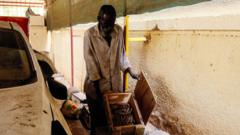Is Israel's move to privatize Gaza food aid a strategic play against Hamas or a humanitarian oversight?
Controversial Gaza Aid Plan Shifts Control from UN to Private Contractors

Controversial Gaza Aid Plan Shifts Control from UN to Private Contractors
New initiative aimed to bypass traditional aid channels could exacerbate tensions in the region
In a significant shift in the humanitarian landscape of Gaza, Israel is poised to introduce a new food aid system that effectively overrides the established role of United Nations agencies and experienced non-governmental organizations (NGOs). This plan, which has been primarily orchestrated by Israeli officials, aims to employ foreign contractors for the distribution of food aid in the territory, a move that could potentially deepen existing tensions within the region.
Throughout the ongoing conflict in Gaza, aid distribution has been largely administered by UN agencies and various established aid groups. However, the newly conceived initiative, characterized by its contentious nature, proposes that responsibility be transferred to a select group of newly formed private organizations that lack significant track records, raising questions about their transparency and neutrality.
Supporters of the initiative tout it as an independent, neutral approach, spearheaded by American contractors. Key figures in the project include Philip F. Reilly, a former senior C.I.A. officer overseeing security arrangements, and Jake Wood, a former U.S. Marine leading fundraising efforts. The rollout of this framework was first announced in early May by Mike Huckabee, the U.S. ambassador to Israel, who contended that labeling it an "Israeli plan" would be a mischaracterization.
However, the origin of this initiative can be traced back to Israel’s own deliberations early in the current conflict. Sources familiar with the project's inception revealed that discussions were initiated in late 2023 among a consortium of officials, military personnel, and business leaders closely aligned with the Israeli government. This group, termed the Mikveh Yisrael Forum, began shaping the idea of shifting food aid away from the UN, leading to concerted lobbying efforts aimed at garnering support from Israel's political and military leadership throughout 2024.
As implementation unfolds, many are left wondering about the potential implications of this arrangement. Will it foster a more equitable aid distribution landscape, or will it serve as a tool for political maneuvering against Hamas? The unfolding events will likely draw significant scrutiny both locally and internationally.
Throughout the ongoing conflict in Gaza, aid distribution has been largely administered by UN agencies and various established aid groups. However, the newly conceived initiative, characterized by its contentious nature, proposes that responsibility be transferred to a select group of newly formed private organizations that lack significant track records, raising questions about their transparency and neutrality.
Supporters of the initiative tout it as an independent, neutral approach, spearheaded by American contractors. Key figures in the project include Philip F. Reilly, a former senior C.I.A. officer overseeing security arrangements, and Jake Wood, a former U.S. Marine leading fundraising efforts. The rollout of this framework was first announced in early May by Mike Huckabee, the U.S. ambassador to Israel, who contended that labeling it an "Israeli plan" would be a mischaracterization.
However, the origin of this initiative can be traced back to Israel’s own deliberations early in the current conflict. Sources familiar with the project's inception revealed that discussions were initiated in late 2023 among a consortium of officials, military personnel, and business leaders closely aligned with the Israeli government. This group, termed the Mikveh Yisrael Forum, began shaping the idea of shifting food aid away from the UN, leading to concerted lobbying efforts aimed at garnering support from Israel's political and military leadership throughout 2024.
As implementation unfolds, many are left wondering about the potential implications of this arrangement. Will it foster a more equitable aid distribution landscape, or will it serve as a tool for political maneuvering against Hamas? The unfolding events will likely draw significant scrutiny both locally and internationally.



















